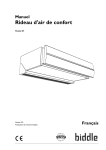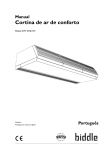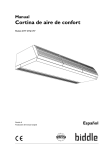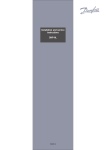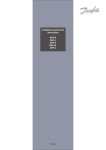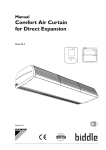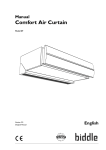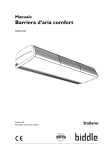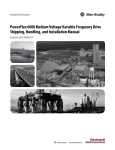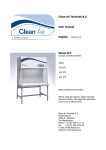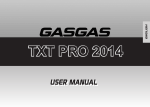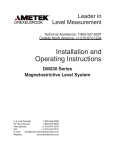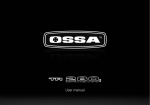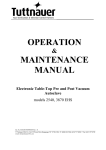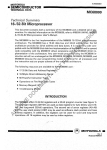Download Manual comfort air curtain model CITY CYV CYQ
Transcript
Manual Comfort air curtain Model CITY - CYV - CYQ Version of Guide: 5.0 Original manual a R COMFORT AIR CURTAIN . . . Table of contents 1 2 Introduction 4 1.1 1.2 1.3 1.4 4 4 5 10 Installation 2.1 2.2 2.3 2.4 2.5 2.6 2.7 2.8 2.9 2.10 2.11 3 Safety instructions Checking for faults Resolving simple problems Remedying faults Service 7.1 2 Replacing or cleaning the filter Cleaning the unit Scheduled maintenance Faults 6.1 6.2 6.3 6.4 7 Switching the unit ON and OFF Controlling the air curtain Maintenance 5.1 5.2 5.3 6 Switching the unit ON and OFF Setting the fan speed Setting the heating (CITY E and CYV) Operation CYQ 4.1 4.2 5 Safety instructions Delivery check General working method Fixing the unit Connecting the unit to the central heating installation Connecting the unit to the Daikin system (CYQ and CYV) Connecting the unit to the power supply Installing control panel and external controls (CITY and CYV) Control system without touch pad controller (CITY and CYV) Finishing the unit Switching on and checking function Operation CITY and CYV 3.1 3.2 3.3 4 About this manual How to read this manual About the unit Safety instructions Safety instructions 12 12 12 12 14 16 17 20 22 27 29 33 35 35 35 36 37 37 38 39 39 40 40 41 41 41 42 43 45 45 7.2 7.3 7.4 7.5 7.6 7.7 7.8 7.9 8 Access to the interior of the unit Electronics module Daikin electronics module (CYQ and CYV) Fuses Venting the heat exchanger (CITY W) Bleeding the heat exchanger (CITY W) Resetting the maximum thermostat (CITY E) Configuration of the Biddle control cable Dismantling Versie: 5.0 (04-06-2012) 45 47 47 48 49 49 49 50 51 3 1 . . Introduction 1.1 About this manual This manual describes the installation, operation and maintenance of the comfort air curtain model CITY, CYQ, CYV. The manual also provides instructions and information on service operations. 1.2 How to read this manual 1.2.1 For CYQ and CYV only: This manual makes cross-reference to the manuals of the Daikin components (outdoor unit, indoor unit, control panel, etc.). 1.2.2 Marginal symbols used in the manual The following symbols are used in this manual: n Note: c Caution: Draws your attention to an important part of the text. If you do not perform this procedure or action correctly, you may damage the unit. Follow the instructions strictly. w Warning: If you do not perform this procedure or action correctly, you may cause damage and/ or bodily injury. Follow the instructions strictly. Versie: 5.0 (04-06-2012) 4 CITY MANUAL INTRODUCTION d Danger: This indicates actions which are not permitted. Ignoring this warning may lead to serious damage or accidents which may involve bodily injury. 1.2.3 Pictograms used on the unit and in the manual The following pictograms indicate potential risks or hazards. The same pictograms will also be found on the unit. Pictograms PICTOGRAM DESCRIPTION w You are entering an area of the unit containing live components. Accessible to qualified maintenance staff only. Exercise caution. w This surface or part can be hot. There is a risk of burns on contact. 1.2.4 Related documentation In addition to this manual, the following document has been supplied with the unit: • 1.3 Wiring diagram for installation and service About the unit 1.3.1 Applications The comfort air curtain is intended for the separation of climates between two rooms, and for heating and filtering (filter class EN779-G2) of air. The unit is installed above the doorway, across its full width. Versie: 5.0 (04-06-2012) 5 INTRODUCTION COMFORT AIR CURTAIN The free-hanging model is designed for free, visible installation above the door. The recessed model is designed for integration into a false ceiling or into a cove, with the inlet opening possibly at some distance from the unit. The cassette model is designed for installation above a false ceiling, with the inlet opening close to the unit and with easy access to the unit. CYQ and CYV The CYQ/CYV air curtain is connected to a Daikin direct expansion system. The air blown through the unit is heated by the cooling medium. The air curtain is controlled and operated partly by the Daikin system and partly by the Biddle system. The system has a number of limitations: • The unit is only suitable for use in Daikin direct expansion systems. • The unit is not suitable for cooling. • The Daikin system has to be active at all times. Other versions and intended use. On request, versions can be supplied for other applications. 6 CITY MANUAL INTRODUCTION w Warning: Applications other than those described above are not considered to be an intended use. Biddle assumes no responsibility for damage or injury resulting from applications other than the intended use. The intended use also implies observance of and compliance with the instructions in this manual. 1.3.2 Function The air curtain blows out a warm air stream straight down, thus achieving the following: • The exchange of air between two rooms due to temperature differences (convection) is stopped. • The cold air entering across the floor due to draught is heated. 1.3.3 Type designation The table below gives an overview of available models of the comfort air curtain and the corresponding type designations. Combined, the type designations constitute the type code, for instance: CITY S-100-W-F. If some part of the manual applies to certain models only, these will be indicated using the corresponding type designation, for example: • CITY S: Models with capacity S • CITY 100: Models with discharge width 100 • CITY W: Water-heated models • CITY E: Electrically-heated models • CITY F: Free-hanging models n Versie: 5.0 (04-06-2012) Note: For the illustrations in this manual, the following unit type is used as a general example: CITY M-150-W-F. The appearance of your unit may be different but its function is the same, unless stated otherwise. 7 INTRODUCTION COMFORT AIR CURTAIN Explanation of the type code PART TYPE CODE DESIGNATION MEANING Product series CITY, CYQ, CYV General designation for the series CYV For connection to Daikin VRV system (‘multi’) CYQ For connection to Daikin ERQ system (‘pair’) Capacity S, M or L Small, medium or large range Discharge width 100, 150, 200 or 250 Discharge width in cm Heating W Water heating E Electric heating A Without heating DK Heating with Daikin direct expansion system F Free-hanging model R Recessed model C Cassette model B White S Aluminium X Non-standard colour C Touch pad controller included N Not included (if several units are connected in one installation) Mounting method Colour (CYQ and CYV only) Control panel (CYQ and CYV only) 1.3.4 Type plate The type plate is located on the front left of the unit. This manual refers to the following data on the type plate: • Type: Complete type code of the unit • M: Weight of the unit • Medium: Heating medium • Capacity index: Daikin capacity index • P max: Maximum permissible working pressure of the hot water circuit (at 230ºF / 110 °C). • U, Imax, Pmotor and Pheating: Maximum load on the electrical system by the unit 1.3.5 Field of application The comfort air curtain is predominantly used in commercial premises at an ambient temperature of max. 40°C. The following limits must thereby be observed: 8 CITY MANUAL INTRODUCTION Application limits Ambient temperature 5°C to 40°C System voltage see type plate Power see type plate Maximum discharge temperature 50°C Heating medium CITY W water with max. 20% glycol Maximum working pressure and temperature CITY W 6 bar at 110°C w Warning: The air curtain must not be employed in potentially explosive atmospheres, wet environments, outdoors or in very dusty or aggressive air. Biddle assumes no responsibility for damage or injury resulting from use in these situations. 1.3.6 CE declaration The unit satisfies the applicable CE standards. The complete CE Declaration of Conformity can be found at: www.biddle.info. Class A product n Note: CYV only: This is a Class A product. In a domestic environment, this product may cause radio interference in which case the user may be required to take adequate measures. 1.3.7 Modifications and changes No modifications or changes may be made to the unit which could influence its safety without the approval of Biddle. Changes or modifications will void the CE declaration. 1.3.8 Components and accessories The following accessories are available as options: • Versie: 5.0 (04-06-2012) Control panel (able to control a maximum of 10 units) (CITY, standard with CYV, not with CYQ) 9 INTRODUCTION COMFORT AIR CURTAIN • Biddle control cable, available in various lengths • Discharge temperature control unit (CITY W only) • Door contact switch • Set of wall brackets n Note: The unit can also be operated without control panel. For CYQ and CYV only: Daikin components The following Daikin components are required for an installation: • Outdoor unit • Optional: One or more indoor units • Daikin control panel (optional for CYV) • Connection materials, such as cooling lines, wiring, etc.: See the installation manual for the outdoor unit. c 1.4 Caution: The control system and the capacity index of the Daikin outdoor unit must correspond to those of the Biddle air curtain. Safety instructions 1.4.1 Operation 10 w Warning: w w Warning: c Caution: Do not put any objects in the inlets and outlets. Do not block the inlets and outlets. Warning: The upper surface of the unit becomes hot during operation. In exceptional situations, water may run out of the unit. Therefore do not place anything under the unit that could be damaged as a result. CITY MANUAL INTRODUCTION 1.4.2 Installation, maintenance and service d w Danger: The unit may be opened by qualified technical staff only. Warning: Perform the following actions before opening the unit: 1. Switch OFF the unit using the control panel. 2. Wait until the fans have stopped. 3. Allow the unit to cool down. c Caution: The heat exchanger and/or the heating elements can get very hot. Moreover, the fans may continue to rotate for a while. 4. For models for connection to a Daikin direct expansion system: Switch OFF the Daikin system and disconnect the mains power supply from the Daikin outdoor unit. 5. Disconnect the power supply (remove plug from power point or move isolation switch to OFF). 6. For water-heated models: Close the central heating supply (if possible). Versie: 5.0 (04-06-2012) c Caution: w Warning: For CYQ and CYV: If the system is operating in defrost mode or has been in operation recently, there may be water in the inspection panel. The fins of the heat exchanger are sharp. 11 2 . . Installation 2.1 Safety instructions w Warning: w Warning: Installation work on the unit may only be performed by qualified technical staff. Before you begin: read the safety instructions. See also: 1.4 Safety instructions 2.2 2.3 10 Delivery check • Check the unit and its packaging for correct delivery. Immediately report to the driver and to the supplier any damage caused in transit. • Make sure that all components and accompanying parts have been supplied. Immediately report any defects to the supplier. General working method 2.3.1 Sequence of operations Biddle recommends the following working method for installing the Comfort Air Curtain: 1. Suspend the unit. 2. For water-heated models: Connect the unit to the central heating system. For models for connection to a Daikin direct expansion system: Install the Daikin components as described in the respective installation manuals. - Versie: 5.0 (04-06-2012) Outdoor unit; If installed in your system: Indoor unit(s); 12 CITY MANUAL INSTALLATION - Control panel. 3. Connect the unit to the mains power supply. 4. Install the control panel and (any optional) connections to external controls. 5. Finish the unit. 6. For models for connection to a Daikin direct expansion system: Connect the air curtain unit to the Daikin system. 7. Turn on the power supply and check the working of the unit. General instructions Some parts of this section are applicable only to certain models. Where this is the case, it will be indicated. If no specific model is referred to, the description applies to all models. n Note: Make sure you perform all installation operations that are required for your unit. Check the type plate and consult the manual if you are not sure about the model or type of your unit. n Note: Protect the unit from damage and ingress of dust, cement, etc. throughout the installation. You can, for instance, use the packaging for protection. See also: 2.4 Fixing the unit 14 2.5 Connecting the unit to the central heating installation 16 2.6 Connecting the unit to the Daikin system (CYQ and CYV) 17 2.7 Connecting the unit to the power supply 20 2.8 Installing control panel and external controls (CITY and CYV) 22 2.9 Control system without touch pad controller (CITY and CYV) 27 2.10 Finishing the unit 29 2.11 Switching on and checking function 33 Versie: 5.0 (04-06-2012) 13 INSTALLATION 2.4 COMFORT AIR CURTAIN Fixing the unit 2.4.1 Determining the location of the unit d Danger: Do not install the unit in a vertical position. • Make sure that the structure from which the unit is about to be suspended can bear the weight of the unit. The weight is specified on the type plate. • Note the following dimensions: - The unit must be at least as wide as the doorway (dimension b). Position the unit as near to the doorway as possible. The maximum mounting height of the unit (dimension h, measured from the floor to the discharge grille) depends on the unit type. Installation height of unit MAXIMUM INSTALLATION TYPE HEIGHT CITY S 2.3 m CITY M 2.5 m CITY L 3.0 m These heights apply only under normal circumstances. If in doubt, ask Biddle for advice on the correct height. w w Warning: The minimum mounting height (dimension h) is 1.8 m. Warning: The top of the unit may get hot. Mount the unit with a minimum clearance of 25 mm from the ceiling (dimension x). See also: 1.3.4 Type plate 14 8 CITY MANUAL INSTALLATION 2.4.2 Fixing the suspension brackets 1. Fix four threaded rods M8 according to the dimensions in the table. Make sure the threaded rods are perpendicular. n Note: Units of type CITY 250 have three suspension brackets. Fix six threaded rods for that type. 2. Apply a lock nut 1 to each threaded rod. 3. Apply the suspension brackets 2 onto the threaded rods, and apply the nuts 3. 4. Make sure the suspension brackets are suspended horizontally and flush. 5. Secure each suspension bracket by tightening the lock nut 1. Dimensions for suspending unit SIZE TYPE DIMENSIONS a all models as needed b CITY S 119 mm CITY M 119 mm CITY L 200 mm c all models 200 mm d CITY 100 500 mm CITY 150 1000 mm CITY 200 1500 mm CITY 250 (six threaded rods) 2 x 1000 mm 2.4.3 Suspending and securing the unit 1. Lift the unit up and hook it into the suspension brackets. c Versie: 5.0 (04-06-2012) Caution: Depending on the weight specified on the type plate, either use a lifting device or lift the unit with at least 2 persons. 15 INSTALLATION COMFORT AIR CURTAIN 2. Fit a lock plate 3 to each suspension bracket. w Warning: The unit may fall down if you do not secure the suspension. 3. Check whether the unit is suspended firmly: - w 2.5 Try to push the unit from its suspension. Shake the unit for a few seconds. Warning: Ensure you do not run any risk, should the unit drop down. Connecting the unit to the central heating installation 2.5.1 Particulars c • The supply and return pipes of the central heating system must be connected to the correct corresponding connections 1. The directions are indicated on the unit using arrows. The maximum permissible operating pressure of the hot water circuit is specified on the type plate. It is based on a water temperature of 110°C. c • Caution: Caution: Biddle recommends the inclusion of a valve in each pipe. The bleed valve 2 of the heat exchanger is located at the left in the top of the unit. 2.5.2 Frost protection Take the following precautions if you install the unit in a room where frost may occur: 16 • Provide for constant circulation of the water at the right temperature; • Add up to 20% glycol to the water when the unit is not in operation during the wintertime; • Or drain the system and the unit. CITY MANUAL INSTALLATION 2.5.3 Connect the unit 1. Connect the unit to the central heating system. 2. Vent the heat exchanger. 3. Check the connections for leaks. 2.5.4 Connecting the discharge temperature control (accessory) The unit can be equipped with an optional discharge temperature control. 1. Remove the inspection panel. 2. Connect valve 1 to the unit. 3. Install capillary sensor 2 in the unit. 4. Fasten the sensor to the heating element using the clips supplied. 5. Replace the inspection panel. 6. Set the discharge air temperature to 35°C. 2.6 Connecting the unit to the Daikin system (CYQ and CYV) 2.6.1 Preconditions for connection to a Daikin system Versie: 5.0 (04-06-2012) • The Daikin system must always be active when the Biddle air curtain is active. • A control system must be connected to the Daikin system. This can also be a Daikin control panel that is connected to the Biddle air curtain. 17 INSTALLATION COMFORT AIR CURTAIN w Warning: Units of type CYV may only be connected to a Daikin VRV system. Units of type CYQ may only be connected to a Daikin ERQ system. These units are not interchangeable. 2.6.2 Connection of the control system All models c Caution: Use cable with a cross-section of min. 0.75 mm². Models with discharge width 150, 200 or 250 1. Connect the system control to terminal X84 on the upper side of the air curtain: - Connect the control cable of the outdoor unit to F1/ F2. If installed on your unit: Connect the Daikin control panel to P1/P2. 2. Install the cable sheath (supplied) on the terminal. Models with discharge width 100 1. Remove the cover of the box on the side of the unit. 2. Optional: Remove the box from the unit: - n 18 Remove the bracket from the unit and the box. Install the box on the wall at an appropriate point. Note: Do not disconnect the wiring between the box and the unit. CITY MANUAL INSTALLATION 3. Lay the control cable(s) into the box, through the free cable gland(s) 3. 4. Connect the controller of the system to the free terminal block 4: - Connect the control cable of the outdoor unit to F1/ F2. If installed on your unit: Connect the Daikin control panel to P1/P2. 5. Tighten the cable gland(s). 2.6.3 Connecting the cooling medium • Install the lines according to the installation manual of the Daikin outdoor unit. • Solder the lines to the pipes protruding out of the upper side of the unit. 2.6.4 Settings on the Daikin control panel You can make local settings on the Daikin control panel as described in the corresponding installation manual. The units described in this manual have a few additional setting possibilities: SECOND CODE NUMBER MODE FIRST CODE DESCRIPTION OF NUMBER NUMBER THE SETTING 01 02 03 04 (22) 3 Function of air curtain when not heating unheated (standard setting) unheated at standstill (if 23-8 is set to 01) -- (23) 8 Function of air curtain in defrost mode at standstill unheated (standard setting) unheated -- Versie: 5.0 (04-06-2012) 19 INSTALLATION 2.7 COMFORT AIR CURTAIN Connecting the unit to the power supply 2.7.1 All models w Warning: w w Warning: Do not turn on the unit from the power supply. Use the control panel. The unit must be earthed (grounded). Warning: Connect the unit in accordance with the applicable local requirements. 2.7.2 Fuse ratings w Warning: Every unit must be separately fused in accordance with the table below. Fuse ratings MAXIMUM AMPERAGE ON MAXIMUM FUSE RATING A TYPE PLATE L1, L2 OR L3 <= 10 A 16 A <= 15 A 20 A <= 20 A 25 A <= 25 A 35 A <= 35 A 50 A <= 50 A 63 A <= 65 A 80 A <= 80 A 100 A <= 102 A 125 A n Note: Multiple units may only be served by a common fuse if their total current consumption is less than 10 A. See also: 1.3.4 Type plate 20 8 CITY MANUAL INSTALLATION 2.7.3 CITY W/A, CYQ and CYV • Ensure that an earthed (grounded) power point is available at a maximum of 1.5 m from the left side of the unit. • Connect the unit to the power supply with a 3-core cable (not supplied). The maximum load data are shown on the type plate. • It must be possible to interrupt the power supply to the unit. You may choose to use either a plugged power supply cable or an isolation switch. 2.7.4 CITY-E d Danger: Do not perform the connection work unless you are qualified to work with three-phase current. • Connect the unit to the mains power supply with a 5-core cable (not supplied). The maximum load data are shown on the type plate. • An isolation switch (not supplied) must be fitted between the unit and the power supply. This switch must: - Be all-pole, Have a minimum contact clearance of 3 mm, Be positioned at a maximum of 4 m from the left side of the unit. 2.7.5 Connecting the unit (CITY E) w Warning: Make sure that the power supply you are working on is switched off. 1. Fit the isolation switch and connect it to the power supply. 2. Remove the inspection panel 1: - Remove the screws on the front side of the inspection panel. Pull the panel a little forward and take it away. c Versie: 5.0 (04-06-2012) Caution: The whole panel will come loose when you pull it forward: Take care it does not fall down. 21 INSTALLATION COMFORT AIR CURTAIN 3. Fix the cable gland 2 to the unit. 4. Lead the power supply cable through the cable gland. 5. Connect the cable to the terminal 3 in the unit according to the wiring diagram. 6. Fit the inspection panel again and screw tight. w Warning: Always secure the inspection panel using flanged bolts with milled edges: These are needed for the earth connection. 7. Connect the power supply cable to the isolation switch. c 2.8 Caution: Do not yet switch the mains supply on. Installing control panel and external controls (CITY and CYV) 2.8.1 Control panel details Positioning • 22 You may fix the control panel either to the wall or to a standard socket. CITY MANUAL INSTALLATION Cabling n Note: Take the following into account, otherwise faults may occur: - The control cable between the control panel and the (first) connected unit must not be more than 50 m long. - Keep control cables away from electromagnetic fields and interference sources such as high-voltage cables and fluorescent tube starters. - Stretch control cables out or roll them up neatly. - Do not remove the dummy plug, unless otherwise stated. n Note: Use only control cables from Biddle. A standard modular telephone cable is not suitable. Multiple units operated from one control panel • Up to 10 units can be connected to one single control panel. To do so, the units must be interlinked. • The total length of the control cables must not exceed 100 m. 2.8.2 Installing the touch pad controller 1. Open the switch 2. Thread the cable through an opening in the rear panel. 3. Fasten the rear panel to the wall. 4. Secure the cable with the strain relief clamp provided. n Note: The cable must protrude some9 cm from the strain relief clamp. 5. Connect the connector of the control cable to the printed circuit board. 6. Put the front panel onto the rear plate. Versie: 5.0 (04-06-2012) 23 INSTALLATION COMFORT AIR CURTAIN 2.8.3 Connecting control panel to unit The control panel connections G and E are located on the connector plate 3 on the upper side of the unit. The two sockets are identical. One of the two sockets has a dummy plug. 1. Connect the control cable to the free terminal G or E. n Note: n Note: Do not remove the dummy plug from the other socket, as this may lead to faults. Leave approx. 30 cm of free cable length: It will be needed to take the electronics out when servicing the unit. Multiple units operated from one control panel 1. For each unit to be linked, remove the dummy plug from socket G or E. 2. Link the units: Connect the control cables to G and E. n Note: Do not remove the dummy plug from the last unit, as this may lead to faults. 2.8.4 Connecting external controls (option) The connector plate on the upper side of the unit has three inputs (X72) for the connection of external controls. The inputs can be used to change the mode of operation of the unit without the intervention of the user. The inputs can be used for connection of e.g. a timer clock, a contact thermostat or a GBS-controlled relay. 1. Connect the cable for the external controls (if used) to the terminals on the connector plate. c 24 Caution: The input is designed for controls with potential free contacts. Biddle recommends the use of components with gold-plated contacts and a low resistance. Preferably lower than 20 mΩ in order to be able to switch 1 mA at 5 VDC. CITY MANUAL INSTALLATION 2.8.5 Functions of the inputs The functions of a control component depends on the terminals to which the component is connected and on the settings on the interface. The table below shows for each control function the terminals to which the control component has to be connected and how the interface has to be set. The setting on the interface relates to the range of the control component: • Local: The control component is active on the unit to which the component is connected • Global: The control component is active not only on the unit to which the component is connected, but also on all other units connected to the same touch pad controller The range is set as standard to local. In order to set the control range to global, a jumper has to be moved on the interface (block X64). The jumper to be moved depends on the control function (see table below). Place the removed jumper in the reserve positions provided (X65). The interface is located inside the unit and is accessible after removing the inspection panel. c Caution: c Caution: For CITY: A jumper is installed as standard between terminals T and G. This jumper has to be removed if you connect a control component to T and G. If you do not install a control component, the jumper must be left in place: The unit will not function without the jumper. For CYV: CYV units are equipped with an release relay which is controlled by the Daikin system. This relay is connected to terminals T and G of block X72. The unit can only be switched ON and OFF when the Daikin system is active. If the Daikin system is not active, the unit is OFF You can choose to switch the unit ON and OFF externally irrespective of the Daikin system. In this case install a jumper or control component between terminals T and G in place of or parallel to the standard wiring. Versie: 5.0 (04-06-2012) 25 INSTALLATION COMFORT AIR CURTAIN Contacts on the terminals of block X72 only have a function when the enable contact is closed by the Daikin system. Functions of inputs FUNCTION TERMI- RANGE NAL LOCAL GLOBAL Switching unit ON and OFF No setting necessary Remove jumper 6 from block 64 on the interface. Change setting. No setting necessary Remove jumper 5 from block 64 on the interface. FUNCTION CONTACT CLOSED CONTACT OPEN T and G The unit is in stand-by. The unit can be switched ON and OFF via the touch pad controller. The unit is OFF and cannot be switched ON or OFF via the touch pad controller. D and G The unit operates 1 level higher than indicated by the touch pad controller. On CITY E the electric heating is also increased. The unit operates as indicated by the touch pad controller. P and G The unit operates at the highest level. On CITY E the electric heating is not increased. The unit operates as indicated by the touch pad controller. D, P and G The unit operates at the highest level. On CITY E the electric heating is also switched to the highest level. The unit operates as indicated by the touch pad controller. Caution: If the electric heating never has to be switched up at the same time, jumper 4 must be removed. This setting has only a local function and therefore has to be made on each unit for which this function is desired. n 26 Note: The functions which use terminals P and G are only available from interface version V4.0 Rev.06 (IC10). The global range for terminals P and G can only be set from touch pad controller version V2.1 Rev.02 and interface version V4.0 Rev.07 (IC10). The standard settings of the jumpers on block X64 are shown in the figure opposite. CITY MANUAL INSTALLATION 2.8.6 Unit output (CYV) CYV units are equipped with an additional output X83 on the unit. The contact to this output is disconnected when the unit is on. This output can be used, for example, for a function signal. 2.8.7 Initialising the touch pad controller In order to inform the touch pad controller how many units are connected, it has to be initialised. Initialisation has to be performed in the following situations: • Before putting the unit into operation. • After connection of additional units to the touch pad controller. • For checking the control cable. 1. Press keys :], and [ simultaneously. 2. Wait 10 seconds. The LEDs of keys ] and [ start to flash. 3. Wait 2 minutes. The LED of key : starts to flash. The number of flashes of the LED corresponds to the number of units connected to the touch pad controller. The unit is now ready for operation. 2.9 Control system without touch pad controller (CITY and CYV) The unit can be controlled using control components such as a GBS-controlled relay, a room thermostat, a timer or a door contact switch. The standard Biddle touch pad controller is then not necessary. It is not possible to set the heating power separately from the fan speed on the following units: • CITY-E • CYV If separate control of the electric heating power is nevertheless required, we recommend the use of a power controller (e.g.: Kimsafe). Versie: 5.0 (04-06-2012) 27 INSTALLATION COMFORT AIR CURTAIN 2.9.1 Modifying the interface In order to adapt the unit for operation without touch pad controller, the interface has to be modified. This is done by removing jumpers 1 and 2 from block X64 on the interface. 1. Switch OFF the power supply. 2. Open the unit (see also the unit operating manual). 3. Move jumpers 1 and 2 to the reserve positions (X65) 4. Close the unit. 2.9.2 Connection of control components c Caution: c Caution: Control components must be connected to block X72 of the connector plate on the outside of the unit. Control components must switch with potential free contacts. Biddle recommends the use of components with gold-plated contacts and a low resistance. Preferably lower than 20 mΩ in order to be able to switch 1 mA at 5 VDC. The control components can activate four functions: • Switching the unit off (OFF) • Switching the unit to low speed (1) • Switching the unit to medium speed (2) • Switching the unit to high speed (3) A function is activated when a control component makes a contact between the connected terminals as shown in the figure. Follow the instructions below to employ one or more functions: 28 CITY MANUAL INSTALLATION 1. Select a control function. 2. Connect the control component to the corresponding terminals P, D, T or G of block X72. Use the circuit diagram opposite. 3. Repeat steps 1 and 2 for each additional component. 4. Connect the unit to the mains power supply. The control system is now ready for use. If you wish to connect several units (max. 10) to 1 control component, the wiring at the terminals has to be connected through between the units. 2.10 Finishing the unit 2.10.1 Finishing free-hanging models Fitting inlet grilles 1. Fit the inlet grilles to the unit: - Hook the grilles onto the upper side of the unit. The back of each grille has a projection. Fit the grille with this projection in the rectangular hole . 2.10.2 Finishing recessed models General n Note: Ensure that the unit remains accessible for maintenance and repair through, for instance, an inspection hatch. Adjusting the discharge duct If installing two or more units alongside one another, you must adjust the discharge duct so that the finishing edges are not in each other’s way. 1. Remove the end piece with finishing edge 1. Versie: 5.0 (04-06-2012) 29 INSTALLATION COMFORT AIR CURTAIN 2. Install the end piece without finishing edge 2. Installing the discharge duct 1. Make a hole in the ceiling for the discharge (for dimensions, see table). 2. Fix the two angle sections 3 with sheet metal screws to the unit, along the edges of the discharge opening. 3. Slide the discharge duct 4 into the discharge opening of the unit until the desired height is reached. 4. Using sheet metal screws, fix the discharge duct to the angle sections 3. Discharge section hole dimensions SIZE TYPE DIMENSIONS a CITY S-R 102 mm CITY M-R 102 mm CITY L-R 133,5 mm CITY 100-R 1008 mm CITY 150-R 1508 mm CITY 200-R 2008 mm CITY 250-R 2508 mm B C b Installing the grille plenum of the inlet section 1. Make a hole in the false ceiling for the inlet section (see table). 30 CITY MANUAL INSTALLATION 2. Remove the inlet grille from its frame: - Push the two pins 1 in the grille towards one another and tilt the grille outward. Push the two pins at 2 towards one another and take the grille out. 3. Mount the grille plenum in the inlet grille frame. 4. Put the grille back into its frame. n Note: The grille plenum may come installed in the inlet grille on delivery. 5. Fix the edge finishing strips to the frame. 6. Suspend the inlet section. To do so, use the supplied screw eyes or four threaded rods M6. Inlet section hole dimensions SIZE TYPE DIMENSIONS a CITY S-R 268 mm CITY M-R 268 mm CITY L-R 368 mm CITY 100-R 1008 mm CITY 150-R 1508 mm CITY 200-R 2008 mm CITY 250-R 2508 mm B C Versie: 5.0 (04-06-2012) b 31 INSTALLATION COMFORT AIR CURTAIN Connect the unit plenum and grille plenum 1. Connect the unit plenum to the grille plenum using flexible ducts. Use hose clips to fix the ducts. Plenum duct diameter TYPE DUCT DIAMETER CITY S-R 160 mm CITY M-R 160 mm CITY L-R 250 mm 2.10.3 Finishing cassette models n Note: With unit types CITY 200 and CITY 250, the components of the inlet section are supplied in two parts. Installing the inlet case 1. Mount the inlet case on the unit: - Hook the inlet case onto the upper side of the unit. Screw flange 1 of the inlet case to the unit. 2. Fix the angle points 2 of the inlet case to the ceiling. To do so, use the supplied screw eyes or two threaded rods, M6. w Warning: If you do not fix the inlet case to the ceiling, the unit may tip over and fall out of the suspension brackets. Installing the inlet plenum 1. Remove the inlet grille from its frame: - 32 Push the two pins 1 in the grille towards one another and tilt the grille outward. Push the two pins at 2 towards one another and take the grille out. CITY MANUAL INSTALLATION 2. Screw the frame 3 onto the inlet case. 3. Put the grille back into its frame. Finishing 1. Fix the edge finishing strips around the unit. 2. In the false ceiling, make a hole of the dimensions stated in the table. Unit hole dimensions SIZE TYPE DIMENSIONS a CITY S-C 829 mm CITY M-C 829 mm CITY L-C 1113 mm CITY 100-C 1008 mm CITY 150-C 1508 mm CITY 250-C 2508 mm B C 2.11 b Switching on and checking function 1. For all models: Check the following connections: - Power supply; Control cable(s) between control panel and unit(s); For CYQ and CYV: Control cables between unit(s) and Daikin components. External control components (if used). 2. For CYQ and CYV: 1. Switch ON the Daikin indoor units and outdoor unit. Versie: 5.0 (04-06-2012) 33 INSTALLATION COMFORT AIR CURTAIN 2. Test the Daikin system as described in the installation manual for the outdoor unit 3. For all models: 1. Switch ON the power supply and/or plug in all connected units. 2. Switch ON the air curtain using the control panel. 3. Initialise the control panel 4. For CITY W and CYV: 1. Check that the heat exchanger is connected correctly. 2. Check that the central heating system or the Daikin system is switched on. 3. Feel whether the discharged air stream gets warm. This may take some time. 4. Vent the heat exchanger, if necessary. For CYQ: Operate the unit using the Daikin control panel and check the function: 1. Switch ON the system. The unit must start to discharge air. 2. Set the operating mode to heating and set the temperature to Maximum. After a short time, the unit must start to discharge warm air. 3. Set the operating mode only to fan. After a short time, the unit must start to discharge cool air. 4. Switch OFF the system. After a short time, the unit must switch itself OFF. For CITY E: 1. Make sure heating is enabled in the control panel. 2. Feel whether the discharged air stream gets warm. For CTY A: Feel whether the unit discharges air. 34 3 . . Operation CITY and CYV The CITY and CYV units are equipped with a touch pad controller. Depending on the version, the touch pad controller has 3 or 5 keys. These keys allow the user to make the following settings: • Switching the unit ON and OFF. • Setting the fan speed - key :, ] and [. • Setting the heating - key ' and " (CITY E and CYV). It is possible that a thermostat is connected to the unit. In this case, consult the appropriate manual for instructions. 3.1 Switching the unit ON and OFF The unit is OFF when none of the LEDs above key :, ], or [ is lit. Switch ON the unit by pressing one of the keys. Switch OFF the unit by pressing the fan setting key (key :, ], or [) above which the LED is lit. The unit stops and the LED above the key goes out. 3.2 Setting the fan speed The unit has three fan speeds. • Press : to switch the fan to low speed. • Press ] to switch the fan to medium speed. • Press [ to switch the fan to high speed. n Note: Switch OFF the unit by pressing the key above which the LED is lit. 3.2.1 Recommended setting To achieve maximum climate separation with minimum energy consumption, Biddle recommends selection of the lowest setting at which no draught occurs. Versie: 5.0 (04-06-2012) 35 OPERATION CITY AND CYV 3.3 COMFORT AIR CURTAIN Setting the heating (CITY E and CYV) The unit has two heating levels. • Press ' to switch the heating to low level. • Press " to switch the heating to high level. n Note: n Note: Switch OFF the heating by pressing the key above which the LED is lit. If you press " while the unit is set to low fan speed, the unit will automatically switch to medium fan speed for safety reasons. On the CYV, the discharge temperature remains more or less constant, but the total heating capacity is increased. 36 4 . . Operation CYQ Daikin control panel The air curtain is operated with the Daikin control panel. Most functions on the Daikin control panel operate as described in the corresponding operating manual. A number of functions operate differently or do not operate at all. 4.1 Switching the unit ON and OFF 4.1.1 Switching the system ON and OFF • Press the key to switch the system ON or OFF. When the LED alongside this key is lit, the system is switched on. If the LED flashes, there is a fault. 4.1.2 Selecting the operating mode Select the operating mode with key : • Fan only (symbol unheated air. ): The air curtain constantly discharges • Heating (symbol ): The heating of the air curtain is controlled automatically. Other operating modes are not available. 4.1.3 Defrosting Whenever the Daikin control panel displays the symbol , the system is operating in defrost mode. The air curtain then discharges unheated or cold air, or does not function (depending on the setting on the control panel). Defrosting is automatically activated by the system whenever it becomes necessary. When defrosting has been completed, the unit operates normally again. Versie: 5.0 (04-06-2012) 37 OPERATION CYQ COMFORT AIR CURTAIN See also: 2.6.4 Settings on the Daikin control panel 4.2 19 Controlling the air curtain 4.2.1 Controlling the air curtain strength The air curtain has two preset strengths. • Switch over the strength using the key Key . has no function. Recommended setting To achieve maximum climate separation with minimum energy consumption, Biddle recommends selection of the lowest setting at which no draught occurs. 4.2.2 Controlling the heating Display on Daikin control panel (example) • Set the desired room temperature using the keys . The system controls the heating of the air curtain automatically. Heating is stopped when the set room temperature is reached. The air curtain then discharges unheated air or stops (depending on the settings on the Daikin control panel). n Note: In order to avoid problems with draughts, Biddle recommends that the temperature is set to Maximum. See also: 2.6.4 Settings on the Daikin control panel 38 19 5 . . Maintenance 5.1 Replacing or cleaning the filter The filter must be cleaned regularly. A dirty filter may cause inadequate heating as well as a high noise level. The interval at which the filter is to be cleaned depends on the local conditions. You may clean the filter with, for instance, a vacuum cleaner. After some cleanings, however, the filter must be replaced. New filters can be ordered from Biddle. 5.1.1 Removing the filter Free-hanging models 1. Remove the inlet grille from the unit: - Lift the grille at the bottom and unhook it. 2. Remove the grille from the inlet grille: - Insert your fingers into the holes at 1, Pull in the direction shown. 3. Clean or replace the filter. Versie: 5.0 (04-06-2012) 39 MAINTENANCE COMFORT AIR CURTAIN Recessed and cassette models 1. Open the inlet grille: - Push the two pins 1 towards one another – the grille will tilt down. 2. Slide the filter out of the grille. 3. Clean or replace the filter. 5.2 Cleaning the unit You may clean the exterior of the unit with a damp cloth and a domestic cleansing agent. Do not use any solvents. c 5.3 Caution: Make sure no water runs into the unit. Scheduled maintenance Biddle recommends that the following inspection and maintenance work is performed by an installer or other technical expert every year. • Check if the filter is clean enough and undamaged. Replace the filter if necessary. • Check that the heat exchanger or the electric heating elements are clean. Settled dust may cause unpleasant smells. Gently remove dust with a vacuum cleaner. c w • 40 Caution: The fins of the heat exchanger are delicate parts. Warning: The fins of the heat exchanger are sharp. Check the operation of the fans. 6 . . Faults 6.1 Safety instructions d Danger: w Warning: Work on the unit’s interior may be performed only by appropriately qualified technical staff. Before you begin: read the safety instructions. See also: 1.4 Safety instructions 6.2 10 Checking for faults n Note: You do not need to be an expert to carry out the following checks. If you suspect a fault, carry out the following to determine whether there is a fault: 1. Carry out the following steps to determine whether the phenomenon can be easily remedied or whether it is caused by a fault. 2. If you determine that there is a fault that cannot be remedied by the following steps, please contact your supplier. 6.2.1 For CYQ: 1. Set the system to heating mode with the Daikin control panel and set the temperature to Maximum. - If the unit does not discharge air or warm air after 15 minutes, then there is a fault. 2. Set the temperature to Minimum. - Versie: 5.0 (04-06-2012) If the unit still discharges warm air after 15 minutes, then there is a fault. 41 FAULTS COMFORT AIR CURTAIN See also: 6.3 Resolving simple problems 6.4 Remedying faults 6.3 42 43 Resolving simple problems If you suspect a fault, first try to resolve the problem using the below table. You need not be an expert for this. PROBLEM PROBABLE CAUSE WHAT TO DO The unit is not functioning, the touch pad controller does not react when pressed. No power supply to the touch pad controller. Check the power supply: • Plug in power point, • Isolation switch, • Unit live. The air curtain is switched OFF but is still working. No power supply to the unit. Check the power supply to the unit. The touch pad controller has not been initialised. Initialise the touch pad controller. Poor contact from modular plug or break in cable. Check the contacts of the plug (possibly remove any packaging film). If necessary, replace the cable. Only electrically-heated models: The unit cools down automatically. This is not a fault. Normally, the unit will automatically shut down within 10 minutes. For units connected to a Daikin system CYQ and CYV: The display of the control panel is blank. No power supply to the unit to which the control panel is connected. on the Daikin control Key panel is not functioning. This key has no function. The air curtain is not functioning. The system is switched OFF, or has automatically switched off the air curtain. Check the settings on the Daikin control panel. The air curtain discharges unheated air. A fault has occurred in the Daikin system Check the settings on the Daikin control panel. The Daikin system has automatically switched the heating off. Check the settings on the Daikin control panel. The system is operating in defrost mode. This takes 5 to 10 minutes. Wait until defrosting has been completed. The air curtain discharges unheated or cold air, or does not function, and the Daikin control panel shows . 42 Check the plug and the mains power supply. CITY MANUAL FAULTS See also: 2.6.4 Settings on the Daikin control panel 2.8.7 Initialising the touch pad controller 4.1 Switching the unit ON and OFF 4.1.1 Switching the system ON and OFF 6.4 19 27 37 37 Remedying faults If you suspect a fault: 1. Check whether the problem can be easily resolved. 2. Try to resolve the problem using the table below. Technical expertise is needed for this. PROBLEM PROBABLE CAUSE WHAT TO DO The control panel works normally but the unit does not respond. No jumper between terminals T and G. Install a jumper between terminal T and terminal G on block X72. The unit is controlled by a signal from an external control. Check the inputs and the jumpers The fans are receiving no power. 1. Check the transformer fuse. 2. Check the wiring between the transformer and the fans. 3. Replace the transformer. The unit is not functioning, the touch pad controller does not react when pressed. The unit is receiving no power. Check the power connections and wiring. The connection between the control panel and the printed circuit board is not correct. 1. Check the control cable. The printed circuit board is not working. 1. Check fuse F2. 2. Check the wiring between connector plate and printed circuit board. 2. Check the power supply cable. 3. Replace the printed circuit board. One fan is not working. The control panel is defective. Check the control panel by connecting it to another unit with another cable. Replace the control panel if it does not work. The fan is receiving no power or is defective. 1. Check the wiring of the fan. 2. Check the transformer fuse. 3. Replace the fan. Versie: 5.0 (04-06-2012) 43 FAULTS COMFORT AIR CURTAIN PROBLEM PROBABLE CAUSE WHAT TO DO The fans do not operate at a certain strength. The connection to the relevant tap is not correct. 1. Check the transformer connections. 2. Check the wiring between printed circuit board and transformer. The electric heating is not functioning. The unit has been overheated. Check the high limit thermostat. The unit functions differently from expectations. 1. Control components may not be connected correctly. Check the installation. 2. The settings of jumpers 1, 2 and 3 (red) differ from the standard. Check the positions of the jumpers. For units connected to a Daikin system CYQ and CYV: The display of the Daikin control panel is blank. No power supply to the connected unit. Poor connection to the control panel. 1. Check the power supply. 2. Consult the installation manual of the control panel. The Daikin electronics in the air curtain are defective. 3. Contact the supplier. The Daikin control panel signals a fault (flashing LED and/or error code). Daikin electronics in the unit or outdoor unit detects a fault. 1. Consult the service manual of the outdoor unit. The air curtain does not function although the Daikin control panel indicates that it is functioning normally. Fault in Biddle electronics, transformer, fuse or fans in the unit. 2. Contact the supplier. 1. Check the fuses. 2. Check the wiring connections to the transformer. 3. Check the wiring between components in the unit. The unit constantly discharges cool air and/or condensation drips from the unit. There is a fault in the air curtain. Warning: This situation can result in danger and/or damage. 1. Switch OFF the whole system immediately. 2. Contact the supplier. See also: 2.8.5 Functions of the inputs 25 2.6.4 Settings on the Daikin control panel 19 2.8 Installing control panel and external controls (CITY and CYV) 22 2.9 Control system without touch pad controller (CITY and CYV) 27 7.3 Electronics module 47 7.4 Daikin electronics module (CYQ and CYV) 47 7.5 Fuses 48 7.8 Resetting the maximum thermostat (CITY E) 49 44 7 . . Service 7.1 Safety instructions w Warning: w Warning: Service work on the unit may only be performed by qualified technical staff. Before you begin: read the safety instructions. See also: 1.4 Safety instructions 7.2 10 Access to the interior of the unit 7.2.1 For all models 1. Switch OFF the unit using the control panel. w Warning: Disconnect the power supply (remove plug from power point or move isolation switch to OFF). 7.2.2 For free-hanging models 1. Remove the inlet grilles from the unit: - Versie: 5.0 (04-06-2012) Lift the grille at the bottom and unhook it. 45 SERVICE COMFORT AIR CURTAIN 7.2.3 For cassette models 1. Remove the inlet grille from its frame: - Push the two pins 1 in the grille towards one another – the grille will tilt down. Push the two pins at 2 towards one another and take the grille out. 2. Loosen screws 3 and remove the frame. 7.2.4 For all models 1. Remove the inspection panel 1: - 46 Remove the screws on the front side of the inspection panel. Pull the panel a little forward and take it away. c Caution: w Warning: The whole panel will come loose when you pull it forward: Take care it does not fall down. When replacing the inspection panel, always attach it using flanged bolts with milled edges: These are needed for the earth connection. CITY MANUAL 7.3 SERVICE Electronics module The unit contains one electronics module. Depending on the version, this includes i.a.: • The transformer; • The printed circuit board; • The connector plate; • The fuses. 7.3.1 Removing the electronics module 1. Switch OFF the unit using the control panel. w Warning: Disconnect the power supply (remove plug from power point or move isolation switch to OFF). 2. Remove the inspection panel. 3. Disconnect all unit-connected connectors and grounded connections from the printed circuit board. 4. Remove the screws 1. 5. Remove the electronics module. 6. Disconnect the connectors from the connector plate. 7.4 Daikin electronics module (CYQ and CYV) In addition to the Biddle electronics, the unit also contains a Daikin electronics module. Versie: 5.0 (04-06-2012) 47 SERVICE COMFORT AIR CURTAIN 7.4.1 Access to the Daikin electronics in the unit All models 1. Remove the inspection panel 1 from the unit. 2. The Biddle electronics is located at 2. Models with discharge width 150, 200 or 250 1. Remove cover 3. The Daikin electronics are located behind this cover. Models with discharge width 100 1. Remove the cover 4 of the box on the side of the unit. The Daikin electronics are located behind this cover. 7.5 Fuses The unit has two fuses: 1. Transformer fuse 1. 2. Printed circuit board fuse F60 2. The values are indicated for the fuses. For CYQ and CYV only: The Daikin electronics module has one extra fuse on the printed circuit board, indicated with F1U. 48 CITY MANUAL 7.6 SERVICE Venting the heat exchanger (CITY W) The air relief valve 2 is located in the upper left of the unit. 7.7 Bleeding the heat exchanger (CITY W) The drain plug 1 is located on the left of the unit. 7.8 Resetting the maximum thermostat (CITY E) The unit is equipped with a maximum thermostat. This has to be reset manually if it trips. 1. Switch OFF the unit. 2. Remove the inspection panel. 3. Localise 1 and reset 2 the maximum thermostat. 4. Close the unit. c Versie: 5.0 (04-06-2012) Caution: A power failure can cause the maximum thermostat to trip. 49 SERVICE 7.9 COMFORT AIR CURTAIN Configuration of the Biddle control cable The control cable for Biddle units is different from standard modular telephone cables. The plugs are of the RJ-11 type but the sockets are ‘straight’: At both ends of the cable, the core is connected to the same pin. Colour coding of Biddle cables 50 Pin Colour 1 (not used) 2 black 3 red 4 green 5 yellow 6 (not used) 8 . . Dismantling Dismantling of the installation, handling of the cooling medium, oil and other parts must be carried out by an authorised fitter in accordance with the relevant local and national legislation. In line with European legislation, old electrical and electronic equipment must be collected for recycling. By ensuring that this product is disposed of in the correct manner you can help to prevent a potentially negative impact on the environment and health. For further information, please contact your supplier or public authorities. Versie: 5.0 (04-06-2012) 51 Copyright and trademarks All the information and drawings in this manual are the property of Biddle and may not be used (other than for the actual operation of the device), photocopied, duplicated, translated and/or be brought to the attention of third parties without Biddle’s prior written permission. The name Biddle is a registered trademark. Warranty and Liability Please refer to Biddle’s Terms of Sales and Delivery for warranty and liability conditions. Biddle excludes liability for consequential loss at all times and under all circumstances. Liability for the contents of this manual However much care might have been taken in ensuring the correctness and, where necessary, completeness of the description of the relevant parts, Biddle disclaims all liability for damage resulting from any inaccuracies and/or deficiencies in this manual. Should you detect any errors or ambiguities in this manual then we would be pleased to hear from you: it helps us to improve our documentation even further. Biddle retains the right to change the specifications stated in this manual. For more information If you have any comments or questions about specific topics relating to this product, please do not hesitate to contact Biddle. Address for the UK: Address for other countries: Biddle Air Systems Ltd. St. Mary’s Road Nuneaton Warwickshire CV11 5AU United Kingdom Biddle bv P.O. Box 15 NL-9288 ZG Kootstertille The Netherlands tel: fax: tel: fax: 024 7638 4233 024 7637 3621 e-mail: [email protected] internet: www.biddle-air.com 52 +31 512 33 55 24 +31 512 33 55 54 e-mail: [email protected] internet: www.biddle.info




















































